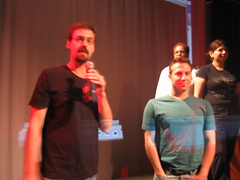We need a Moore’s law for web development. I think it should go something like this: Within two years time, it will become within reach for the average developer to re-create the 50 out of 100 of the top sites on the internet in a matter of 6 month.
For instance, from a purely technical standpoint, many of my students are perfectly capable of building Flickr, Del.icio.us, YouTube, MySpace and the like. This is not to say that they can create those sites, just that they have the skills to build them. By create, I mean the incredible amount of work that it takes to get the requisite number of users using them and visitors visiting them and other special sauces that go into making a successful web venture.
(This is also not to say that they can build them from scratch, thankfully for them, many open source projects have taken on much of the burden and gotten them past some of the more technically tricky portions. In fact, open source is a crucial part of my argument.)
So, what’s so special about Flickr, YouTube and MySpace that keeps people coming back?
Well, momentum is one thing.
Flickr certainly wasn’t the first photosharing app, YouTube was no where near the first online video aggregation site and MySpace is among a series of hot social networking sites that have gone into and out of vogue.
While the fact will remain that the average developer will not re-create these sites, the possibility is there.
So what will my students build?
Why should you care?


